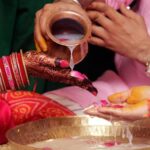Are you interested in learning how to become a wedding officiant in Wisconsin? Becoming a wedding officiant is a rewarding way to be a part of someone’s special day, and in this article, we will explore the steps and requirements to become an officiant in the state of Wisconsin.
As a wedding officiant, you will have the important role of overseeing and leading the wedding ceremony. This includes guiding the couple through their vows, ensuring that the ceremony adheres to legal requirements, and creating a personalized and meaningful experience for the couple and their guests. In Wisconsin, there are specific regulations and requirements that must be met in order to legally perform a wedding ceremony.
In this comprehensive guide, we will walk you through everything you need to know about becoming a wedding officiant in Wisconsin. From understanding the role of an officiant to completing necessary paperwork and certification processes, we have compiled all the information you need to embark on this fulfilling journey.
Whether you are considering becoming an officiant for friends and family or are looking to start your own officiating business, this article will provide you with all the essential information to get started.
Requirements to Become a Wedding Officiant in Wisconsin
To become a wedding officiant in Wisconsin, there are specific requirements that must be met. First and foremost, individuals must be at least 18 years old and have no felony convictions. Additionally, it is necessary to complete an officiant training program from a recognized organization.
One of the most popular programs is offered online by the Universal Life Church (ULC) and takes just a few minutes to complete. Once the training program is successfully finished, individuals can move on to the next steps in becoming a wedding officiant in Wisconsin.
After completing the required training, the next step is to obtain all necessary paperwork and certifications. In Wisconsin, marriage officiants must register with their local county clerk before performing any weddings. The registration process typically involves submitting an application, providing proof of ordination or licensure from a religious organization or seminary, and paying any required fees.
Aside from meeting the legal requirements to become a wedding officiant in Wisconsin, it’s essential to start building a personalized and meaningful wedding ceremony. Whether working with couples who want traditional or non-traditional ceremonies, it’s important for every officiant to work closely with each couple to develop a ceremony that reflects their unique love story and values. This not only creates a special and memorable experience for the couple but also sets officiants apart in their profession.
| Requirement | Description |
|---|---|
| Age | At least 18 years old |
| Criminal Record | No felony convictions |
| Training Program Completion | Complete an officiant training program from a recognized organization like ULC |
Understanding the Laws and Regulations for Officiating Weddings in Wisconsin
When pursuing a career as a wedding officiant in Wisconsin, it is crucial to have a solid understanding of the state’s laws and regulations regarding officiating weddings. Whether you plan to become ordained through a religious organization or apply for temporary officiant status, it is essential to ensure that you are following all necessary legal procedures before performing any marriage ceremonies.
To help you navigate the complex legal landscape of officiating weddings in Wisconsin, here are some key points to consider:
1. Ordination Requirements: If you choose to become ordained through a religious organization, familiarize yourself with the specific requirements set forth by that organization. While some religious organizations may have straightforward ordination processes, others may have more rigorous requirements for individuals seeking ordination.
2. Temporary Officiant Status: For individuals who do not wish to pursue ordination through a religious organization, Wisconsin offers a temporary officiant status that allows non-ordained individuals to legally perform marriage ceremonies. To obtain this status, applicants must submit an application and fee to the county clerk’s office where the ceremony will take place.
3. Marriage License Laws: Familiarize yourself with Wisconsin’s marriage license laws, including the requirements for obtaining a marriage license, waiting periods, and any restrictions on who can marry in the state.
By understanding these laws and regulations, aspiring wedding officiants can ensure that they are legally able to perform marriage ceremonies in Wisconsin and avoid any complications or legal issues down the line. With thorough knowledge of the legal requirements for officiating weddings in Wisconsin, you can confidently pursue your career as a wedding officiant and provide couples with personalized and meaningful wedding ceremonies within the bounds of the law.
Finding and Choosing the Right Officiant Training Program
When it comes to becoming a wedding officiant in Wisconsin, finding and choosing the right officiant training program is a crucial step in the process. Whether you are looking to perform religious or secular ceremonies, obtaining proper training will equip you with the necessary skills and knowledge to conduct a memorable and meaningful wedding ceremony.
Understanding the Options
There are various options available for individuals seeking officiant training programs in Wisconsin. From online courses to in-person workshops, it’s important to consider which format best suits your learning style and schedule. Some programs may focus on specific religious or cultural traditions, while others provide a more general approach to officiating weddings.
Researching Program Accreditation
When searching for the right officiant training program, it’s essential to look for accreditation and certification. Programs that are accredited by recognized organizations or institutions can provide assurance of quality education and adherence to industry standards. Additionally, some states may have specific requirements for approved training programs, so be sure to research what is recognized in Wisconsin.
Considering Curriculum and Support
Before enrolling in an officiant training program, take the time to review the curriculum and resources offered. Look for programs that cover topics such as ceremony structure, legal requirements, communication skills, and practical guidance for creating personalized ceremonies. It’s also beneficial to consider whether the program offers ongoing support or resources for newly ordained officiants as they begin their practice.
By carefully researching and choosing the right officiant training program, aspiring wedding officiants can gain the necessary knowledge and confidence to embark on their journey of joining couples in marriage.
Completing the Necessary Paperwork and Certification Process
Becoming a wedding officiant in Wisconsin requires completing the necessary paperwork and certification process. After choosing the right training program, you will need to submit an application to become a licensed officiant in the state. The requirements for this process may vary depending on your location within Wisconsin, so it is important to research the specific regulations for your area.
One of the most important steps in this process is obtaining your officiant license. In Wisconsin, this typically involves filling out an application with the county clerk’s office and paying a fee. You may also need to provide documentation such as proof of ordination or other credentials, so be sure to gather all necessary materials before beginning the application process.
Once you have submitted your application, there may be a waiting period before your officiant status is officially approved. During this time, it can be helpful to familiarize yourself with any additional requirements or legal obligations for officiating weddings in Wisconsin. This may include understanding marriage license laws, filing marriage certificates, and adhering to any other regulations set forth by the state.
Building a Personalized and Meaningful Wedding Ceremony
Getting to Know the Couple
Before starting to plan the wedding ceremony, it’s essential for the officiant to spend time getting to know the couple. This can be done through meetings, phone calls, or questionnaires. Understanding their backgrounds, cultural or religious traditions, and personal beliefs will help in creating a ceremony that truly represents who they are as a couple.
Customizing the Ceremony
Once you have gathered information about the couple, it’s time to begin customizing the wedding ceremony. This may involve incorporating traditional elements, such as readings or rituals, as well as creating unique moments that symbolize the couple’s relationship. Furthermore, offering personalized vows or including family members in the ceremony can make it even more special for everyone involved.
Rehearsing and Finalizing Details
After planning the ceremony, it is important to schedule a rehearsal with the couple at the wedding venue. This will give everyone involved a chance to practice and make any final adjustments. It also provides an opportunity for the couple to feel comfortable with the flow of the ceremony and address any last-minute concerns. Making sure everything is finalized and ready will help ensure that the actual wedding day goes smoothly.
By focusing on these steps, as well as adding your own personal touch and creativity into each ceremony you perform, you can ensure that you are providing couples with a truly personalized and meaningful experience on their special day.
Marketing Yourself as a Wedding Officiant in Wisconsin
Becoming a wedding officiant in Wisconsin can be a rewarding and fulfilling experience, but it’s important to have a plan for marketing yourself and attracting potential clients. Here are some tips for getting your name out there and building your reputation as a wedding officiant in the Badger State:
Create a Professional Online Presence
One of the best ways to market yourself as a wedding officiant is to have a professional and user-friendly website. This will be the first point of contact for many couples searching for an officiant, so make sure it showcases your services, testimonials from past clients, and any special skills or experiences you bring to the table.
Network With Wedding Professionals
Building relationships with other wedding professionals such as planners, photographers, and venue managers can greatly expand your reach. Consider attending industry events, joining professional organizations, and offering to collaborate with other vendors in order to establish yourself within the local wedding community.
Utilize Social Media and Online Directories
Social media platforms like Instagram and Facebook can be powerful tools for reaching engaged couples. Additionally, consider listing your services on online directories specifically geared towards weddings, where couples often turn to when looking for vendors for their big day. Make sure to keep these platforms updated with engaging content that showcases your expertise and unique style.
By implementing these marketing strategies tailored specifically to becoming a wedding officiant in Wisconsin, you can effectively attract potential clients and build a successful career in the industry. Remember that word-of-mouth referrals will also play a significant role in growing your reputation as an officiant, so providing exceptional service at every ceremony is key.
Tips for Navigating Your First Wedding Ceremony as an Officiant
Your first wedding ceremony as an officiant can be nerve-wracking, but with the right preparation and mindset, it can also be a rewarding experience. Here are some tips on how to navigate your first wedding ceremony as an officiant in Wisconsin.
First and foremost, it is essential to establish good communication with the couple getting married. Meet with them beforehand to understand their vision for the ceremony, any specific customs or rituals they want to include, and their expectations of you as the officiant. This will help you tailor the ceremony to their preferences and ensure that you are all on the same page.
Next, practice, practice, practice. Rehearse the entire ceremony multiple times on your own or with a friend playing the role of the couple. This will help you become more comfortable with the flow of the ceremony, your speaking parts, and any cues or transitions. Familiarizing yourself with the script will also make you feel more confident when delivering it during the actual wedding.
On the day of the wedding, arrive early at the venue to set up and check everything one last time. Make sure that all necessary documents or paperwork are in order and accessible. It is also important to communicate with other vendors involved in the wedding, such as photographers and musicians, to ensure a smooth coordination of efforts.
Finally, take a deep breath and remember that your role as an officiant is to guide and support the couple through this special moment in their lives. Stay present and focused on creating a beautiful and meaningful experience for them.
Resources and Further Education for Wedding Officiants in Wisconsin
Becoming a wedding officiant in Wisconsin can be an incredibly rewarding and fulfilling experience. However, it’s important to continue seeking education and resources to improve your skills and stay updated on any changes in laws and regulations. There are a variety of resources available for wedding officiants in Wisconsin, from online forums and communities to continuing education programs.
One valuable resource for wedding officiants is the Wisconsin Department of Safety and Professional Services, which provides information on current laws, regulations, and required paperwork for officiating weddings in the state. Additionally, joining local or national wedding officiant organizations can provide access to valuable educational materials, networking opportunities with other experienced officiants, and updates on industry trends.
Continuing education is crucial for staying ahead as a wedding officiant. Whether it’s attending workshops, seminars, or online courses, there are many options available for furthering your knowledge and honing your skills. Remember that each ceremony you lead presents a unique opportunity to learn and grow as an officiant.
By staying engaged with the community of wedding professionals in Wisconsin and continually seeking out new educational opportunities, you can ensure that you are offering the best possible service to couples on their special day. Don’t hesitate to invest time and effort into expanding your knowledge – it will only enhance your ability as a wedding officiant in Wisconsin.
Frequently Asked Questions
What Is Required to Officiate a Wedding in Wisconsin?
In Wisconsin, a person must be at least 18 years old to officiate a wedding. They can become ordained through religious or spiritual organizations, such as churches or online ministries. The ordained individual must register with the Wisconsin Department of Health Services before performing any marriage ceremonies.
Is Getting Ordained Online Legal in Wisconsin?
Yes, getting ordained online is legal in Wisconsin. The state recognizes individuals who have been ordained through online organizations as long as they adhere to the registration requirements set by the state. It’s important to make sure that the online ordination is from a reputable and recognized organization.
How Do I Get a Marriage Certificate in Wisconsin?
To obtain a marriage certificate in Wisconsin, both partners must apply in person at any county clerk’s office within the state. They will need to provide proof of identity and age, fill out an application form, and pay the required fee.
After the marriage ceremony, the officiant and two witnesses sign the marriage certificate, which is then returned to the county clerk’s office for recording. After a waiting period of seven days following the ceremony, the couple can obtain their official marriage certificate from the same office where they applied.

I have been involved in marriages for over 20 years helping couples and singles understand more about them.





